All published articles of this journal are available on ScienceDirect.
Up-Regulation of Inducible Nitric Oxide Synthase by Relaxin in Rat Coronary Endothelial Cells is Not Mediated by Proinflammatory Cytokines
Abstract
Relaxin, best known for its reproductive effects can be also viewed as a cardiovascular hormone. Its action includes a marked increase in coronary blood flow, exerted through the up-regulation of inducible nitric oxide (NO) synthase (NOS II) and NO production in vascular endothelial and smooth muscle cells. This effect seems to involve NF-κB, a classical transcription factor controlling NOS II induction by proinflammatory cytokines. The present study was designed to clarify the mechanisms underlying the relaxin-induced up-regulation of NOS II gene in endothelial cells. Rat coronary endothelial (RCE) cells were grown for 30 min, 2, 6 and 12 h in the absence or presence of 60 ng/ml porcine relaxin. Time-course analysis of the expression of NOS II and the proinflammatory cytokines IL-1β and TNFα was performed. Relaxin induced the expression of NOS II transcript and protein at all these time points. No correlation was observed with the expression profiles of the genes for the assayed cytokines: IL-1β expression showed a first peak at 30 min. followed by a decline and a second peak at 12 h, whereas faint TNF-α expression was only detected at 2 h. Relaxin retained the ability to induce NOS II transcript and to generate NO even in the presence of neutralizing anti- IL1β and/or anti-TNF-α antibodies. The current findings suggest that the induction of NOS II by relaxin in coronary endothelial cells is a direct effect of this hormone and does not depend on a primary cytokine-mediated pathway that eventually results in NF-κB activation and NOS II induction.


